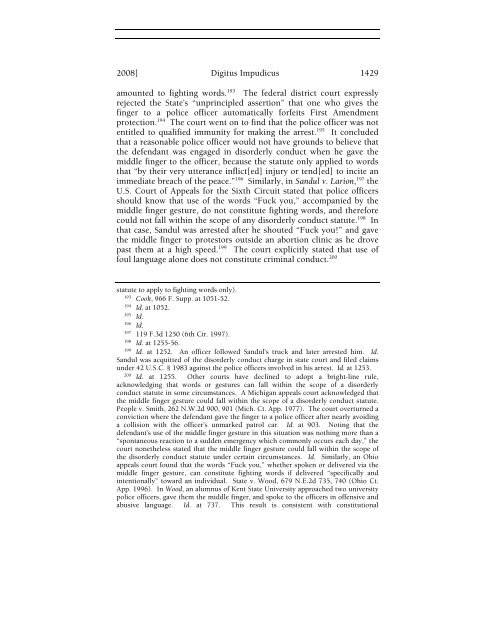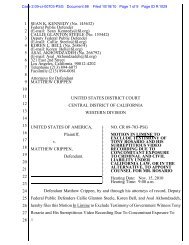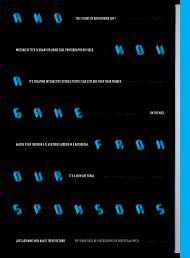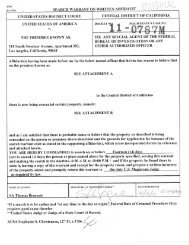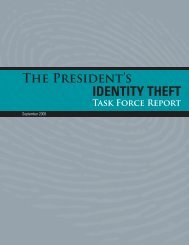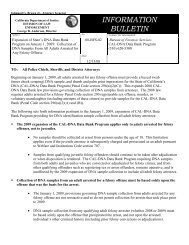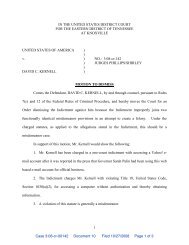Digitus Impudicus: The Middle Finger and the Law - Wired
Digitus Impudicus: The Middle Finger and the Law - Wired
Digitus Impudicus: The Middle Finger and the Law - Wired
Create successful ePaper yourself
Turn your PDF publications into a flip-book with our unique Google optimized e-Paper software.
2008] <strong>Digitus</strong> <strong>Impudicus</strong> 1429<br />
amounted to fighting words. 193 <strong>The</strong> federal district court expressly<br />
rejected <strong>the</strong> State’s “unprincipled assertion” that one who gives <strong>the</strong><br />
finger to a police officer automatically forfeits First Amendment<br />
protection. 194 <strong>The</strong> court went on to find that <strong>the</strong> police officer was not<br />
entitled to qualified immunity for making <strong>the</strong> arrest. 195 It concluded<br />
that a reasonable police officer would not have grounds to believe that<br />
<strong>the</strong> defendant was engaged in disorderly conduct when he gave <strong>the</strong><br />
middle finger to <strong>the</strong> officer, because <strong>the</strong> statute only applied to words<br />
that “by <strong>the</strong>ir very utterance inflict[ed] injury or tend[ed] to incite an<br />
immediate breach of <strong>the</strong> peace.” 196 Similarly, in S<strong>and</strong>ul v. Larion, 197 <strong>the</strong><br />
U.S. Court of Appeals for <strong>the</strong> Sixth Circuit stated that police officers<br />
should know that use of <strong>the</strong> words “Fuck you,” accompanied by <strong>the</strong><br />
middle finger gesture, do not constitute fighting words, <strong>and</strong> <strong>the</strong>refore<br />
could not fall within <strong>the</strong> scope of any disorderly conduct statute. 198 In<br />
that case, S<strong>and</strong>ul was arrested after he shouted “Fuck you!” <strong>and</strong> gave<br />
<strong>the</strong> middle finger to protestors outside an abortion clinic as he drove<br />
past <strong>the</strong>m at a high speed. 199 <strong>The</strong> court explicitly stated that use of<br />
foul language alone does not constitute criminal conduct. 200<br />
statute to apply to fighting words only).<br />
193 Cook, 966 F. Supp. at 1051-52.<br />
194 Id. at 1052.<br />
195 Id.<br />
196 Id.<br />
197 119 F.3d 1250 (6th Cir. 1997).<br />
198 Id. at 1255-56.<br />
199 Id. at 1252. An officer followed S<strong>and</strong>ul’s truck <strong>and</strong> later arrested him. Id.<br />
S<strong>and</strong>ul was acquitted of <strong>the</strong> disorderly conduct charge in state court <strong>and</strong> filed claims<br />
under 42 U.S.C. § 1983 against <strong>the</strong> police officers involved in his arrest. Id. at 1253.<br />
200 Id. at 1255. O<strong>the</strong>r courts have declined to adopt a bright-line rule,<br />
acknowledging that words or gestures can fall within <strong>the</strong> scope of a disorderly<br />
conduct statute in some circumstances. A Michigan appeals court acknowledged that<br />
<strong>the</strong> middle finger gesture could fall within <strong>the</strong> scope of a disorderly conduct statute.<br />
People v. Smith, 262 N.W.2d 900, 901 (Mich. Ct. App. 1977). <strong>The</strong> court overturned a<br />
conviction where <strong>the</strong> defendant gave <strong>the</strong> finger to a police officer after nearly avoiding<br />
a collision with <strong>the</strong> officer’s unmarked patrol car. Id. at 903. Noting that <strong>the</strong><br />
defendant’s use of <strong>the</strong> middle finger gesture in this situation was nothing more than a<br />
“spontaneous reaction to a sudden emergency which commonly occurs each day,” <strong>the</strong><br />
court none<strong>the</strong>less stated that <strong>the</strong> middle finger gesture could fall within <strong>the</strong> scope of<br />
<strong>the</strong> disorderly conduct statute under certain circumstances. Id. Similarly, an Ohio<br />
appeals court found that <strong>the</strong> words “Fuck you,” whe<strong>the</strong>r spoken or delivered via <strong>the</strong><br />
middle finger gesture, can constitute fighting words if delivered “specifically <strong>and</strong><br />
intentionally” toward an individual. State v. Wood, 679 N.E.2d 735, 740 (Ohio Ct.<br />
App. 1996). In Wood, an alumnus of Kent State University approached two university<br />
police officers, gave <strong>the</strong>m <strong>the</strong> middle finger, <strong>and</strong> spoke to <strong>the</strong> officers in offensive <strong>and</strong><br />
abusive language. Id. at 737. This result is consistent with constitutional


